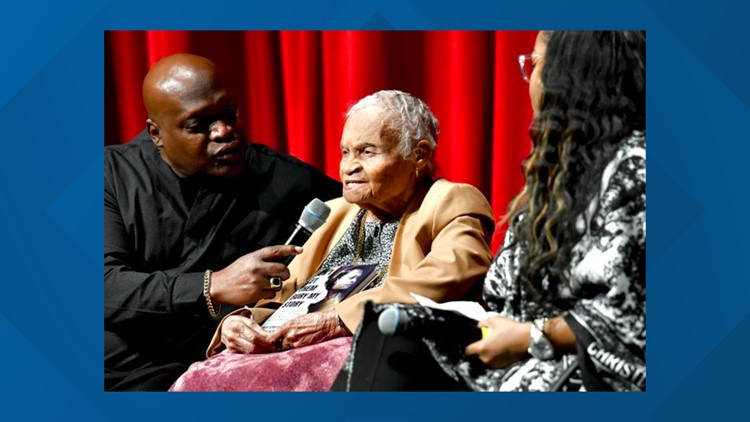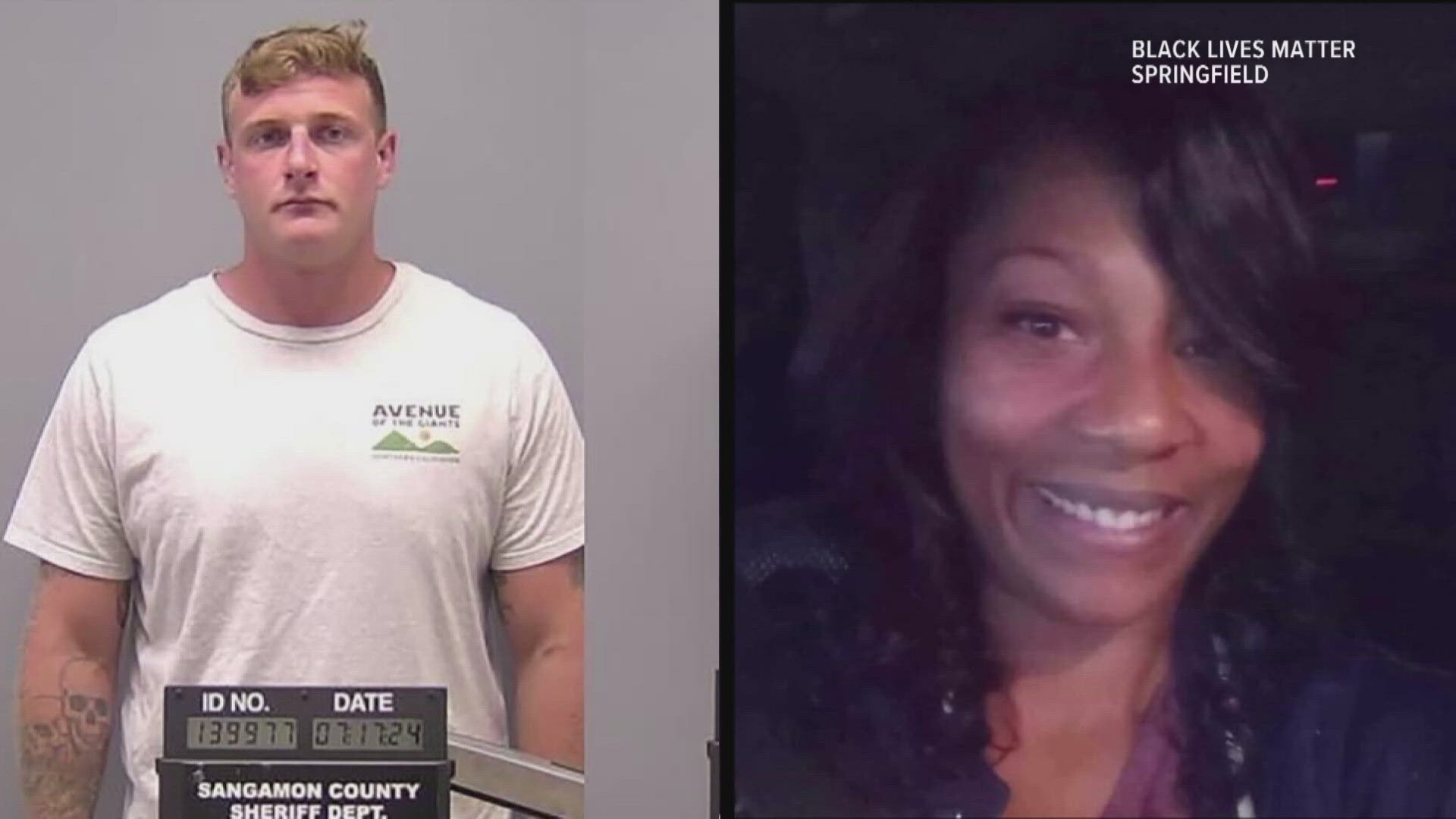EDWARDSVILLE, Ill. — At 109-years-old, amid a busy media tour, it’s understandable that Viola "Mother" Fletcher-the oldest living survivor of the Tulsa Race Massacre-didn’t say much during her presentation at Southern Illinois University Edwardsville yesterday. Still the packed audience inside the university’s Dunham Hall seemed transfixed by the elderly legend’s mere presence.
“She’s Black history, Black present and Black future,” Simone Williams, SIUE Diversity & Engagement librarian said in introducing Fletcher. Using the elderly author as an example, Williams went on to stress the importance of storytelling.
“Through storytelling, we were able to pass down the experiences of our ancestors, the struggles they faced and the traditions and values that are of importance to our communities. I would like for you all to go home and talk to your elders; listen to their stories and learn from them.”
The audience had the opportunity to learn from a legend. Fletcher, now 109 years old, is the oldest known living survivor of what has become known as the “Tulsa massacre.” She is a living testament to that horrendous day in 1921 when a white mob burned about 35 blocks of the Greenwood district of Tulsa, Oklahoma (also known as “Black Wall Street”) to the ground and murdered innocent Black residents.
The venerable author captured the story in her 2023 memoir, Don't Let Them Bury My Story: The Oldest Living Survivor of the Tulsa Race Massacre in Her Own Words, co-written with her grandson, Ike Howard.
"I will never forget the violence of the white mob when we left our home. I still see Black men being shot, Black bodies lying in the street,” Fletcher wrote. “I still smell smoke and see fire. I still see Black businesses being burned. I still hear airplanes flying overhead. I hear the screams … I have lived through the massacre every day. Our country may forget this history, but I cannot.”
Fletcher shared the stage with her grandson, Howard, and writer, producer, director, Jana “J.P.” Haynes. A massive burgundy curtain with golden tassels served as backdrop for Fletcher who was seated in a wheelchair with her book propped faceup on her lap. Haynes delivered questions pre-submitted by the audience while Howard mostly interpreted for his grandmother who he dubbed “the oldest author in the world.”
“Granny, what did you see?” Howard asked, condensing Haynes’ question about what she remembered on the night of the massacre.
“Well, I saw people shot and killed, run over by cars…they burned down the houses were people lived…the churches, schools, grocery stores…they destroyed everything,” Fletcher said recalling what she witnessed at the tender age of seven. “It was really sad for me to look at and I wondered ‘why are people being treated like that?’”
Howard then asked Fletcher what Black Wall Street was like before it incinerated.
“We had everything nice...our churches and stores, schools, playgrounds, parks…things that families and their children could enjoy. I was satisfied living in the neighborhood,” Fletcher answered.
Howard went on to explain how he and his grandmother came to collaborate on the book. He addressed why his grandmother was so afraid to talk about the incident for several years.
“Imagine living in a society where they (whites) controlled everything; the city council, the national guard, the sheriff’s department, the judges, the lawyers…and they burned your entire city to the ground. Then they told you, ‘If you speak of this, we will kill everybody that you love.’ So, she didn’t want to say anything about it…she thought she was protecting me.”
After serving time in the military, Howard said he came home with a “kick-ass attitude” and convinced Fletcher that her story must be told.
“I said, ‘we’re not our ancestors, history will not repeat itself on my watch, I’m not going to let anything happen to you and we can tell the world this story.’”
Howard talked about the post traumatic syndrome (PSD) his grandmother and her relatives suffered for decades after the massacre. Fletcher’s mother, he said, had to be “institutionalized” after enduring repeated nightmares of their home ablaze.
“Everybody had to go into this survival mode every night,” Howard recounted. “They went from having property to going to ground zero with nothing.”
In her book, Fletcher describes how, after the riots, her family lived in a tent about an hour north of the city. When she was 16, she moved back to Tulsa, where “streets that bustled with life just a few years ago now carried the weight of trauma. The destruction was just the visible version of the scars that were inside of us,” she wrote.
Testifying before Congress in 2021, Fletcher provided even more traumatic details.
“The neighborhood I fell asleep in that night was rich — not just in terms of wealth, but in culture, community, heritage, and my family had a beautiful home,” she said, adding: “Within a few hours, all that was gone.”
To this day, Howard said his mother refuses to sleep in a bed. “She’s always in ‘go mode.’ The way she’s sitting right now (onstage) is how she sleeps; she wants the lights on; she wants to face the door…this is how she’s lived her entire life for 100 years.”
Not only has Fletcher recounted the horrors of the 1921 carnage before Congress, but she’s also participated in several lawsuits seeking restitution and reparations for the survivors and descendants of the Tulsa tragedy.
After a lawsuit in 2020, filed by three survivors against the city of Tulsa, the Tulsa Board of Commissioners and the Oklahoma Military Department seeking restitution for the massacre, was dismissed, Fletcher vowed to use her voice as resistance.
“We will continue to fight for truth, for justice, and for the acknowledgment of our suffering. They will not bury my story.”
Sylvester Brown Jr. is the Deaconess Foundation Community Advocacy Fellow.



